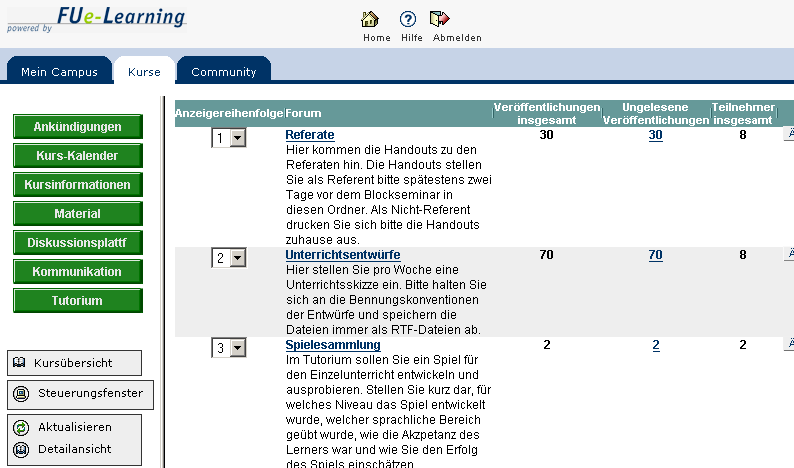Course
| Course title | "Planning, execution and evaluation of one-to-one tutorials" |
Course type | Proseminar and internship |
| Department/Institute | Philosophy and Humanities, Supplementary study couse German as a Foreign Language |
| Lecturer | Maik Walter |
| No. of students (per course) | approx. 12 (per course) |
| SWS/CP | 6 SWS |
Tools
- Intensive usage of the LMS Blackboard in all phases:
- Content areas for the provision of material, student work examples, tools
- Discussion platform for the exchange of teaching designs, for exchanging ideas regarding learning experiences, for collaborative work ideas and the reflection of experiences made whilst teaching
- Weekly publication of teaching sketches (determining a concrete teaching goal, a short agenda plan and a reflection of the tried teaching experiment); Illustration 1 shows the structure of the diiscussion forum (based on Walter 2008).
- A detailed description of the blended learning scenario and the realization of such can be found .
Illustration 1: Discussion platform in the Blackboard course
Realization
In the preparatory phases before the face-to-face sessions the learning content is provided online. The students can, in addition, provide their own material. Material for the block seminars, such as handouts for the presentations, are made available to all of the participants. In the face-to-face sessions, the basics of teaching designs are the topic, all based on language teaching and learning research topics based on inputs by the lecturers, presentations by the students, etc. The phase of independent work is supervised online. The students plan their own teaching experiments in the form of teaching designs that they have sketched out and make these available via the LMS. The evaluation also takes place online. In addition, during the course of the semester the students are given online tasks that partially have to be worked on collaboratively.
Experiences made by the lecturer
Ein unbestrittener Mehrwert wird – gerade zur Einführung einer Lernplattform in die eigene Lehre – mit einem hohen Vorbereitungs- und dementsprechenden Zeitaufwand erkauft." Lehrbeauftragte, die nur einmalig eine Lehrveranstaltung anbieten, rate ich deshalb definitiv von einer umfassenden Einbindung einer Lernplattform ab. Für Dozenten, die standardisierte Kurse unterrichten, lohnt sich dieser Aufwand jedoch. Die investierte Zeit ist gut angelegt, was die Ergebnisse der Seminare gezeigt haben und was ab dem zweiten Durchlauf auch in der Zeitbilanz des Dozenten positiv zu Buche schlägt. Das gesamte Praktikum wurde von den Studierenden umfassend einerseits mithilfe der Delphi-Methode anonym und andererseits in einer schriftlichen Reflexion und einer Gesprächsrunde nichtanonym evaluiert. Dabei wurde von den Studierenden das E-Learning-Angebot besonders positiv bewertet. In den Gesprächsrunden ergaben sich gerade in den ersten beiden Durchläufen sehr konstruktive Vorschläge, das Angebot übersichtlicher zu gestalten. Es wurde zudem auch auf nicht verwendete Funktionen (wie den Terminkalender) aufmerksam gemacht. Diese Vorschläge wurden jeweils in der Aktualisierung des Angebots für den folgenden Einsatz berücksichtigt (Walter 2008:4).
Further information
- Maik Walter (2008). Planning, execution and evaluation of one-to-one tutorials
- Maik Walter (2009). E-Learning im Rahmen der Lehrerbildung: Die Unterstützung der Unterrichtspraktika durch elektronische Lernplattformen. In InfoDaF (36), Heft 4/2009, 381-393.
Support offered by CeDiS
- Consulting services for the implementation of digital solutions in teaching: The Center for Digital Systems (CeDiS) has extensive experience of many years when it comes to the implementation of digital media and systems within the fields of teaching, learning and research. We offer a wide variety of consulting services on the implementation of these tools and systems within the entire academic scope and especially at Freie Universität Berlin.
- Training courses and workshops: For lecturers at Freie Universität Berlin (professors, employees, tutors) as well as lecturers of other universities CeDiS offers training courses and workshops on the topic of teaching and learning with digital media. These course enable participants to implement online elements within their own sphere of teaching.
- The Executive Board of the Freie Universität supports e-learning initiatives: With the e-learning funding program financial resources are provided to lecturers that enrich and improve their courses quality-wise by implementing technological and media-related support. All of the academic staff teaching, the lecturers or even the institutions of the Freie Universität - without the Charité-Universitätsmedizin - can be supported within this program.
